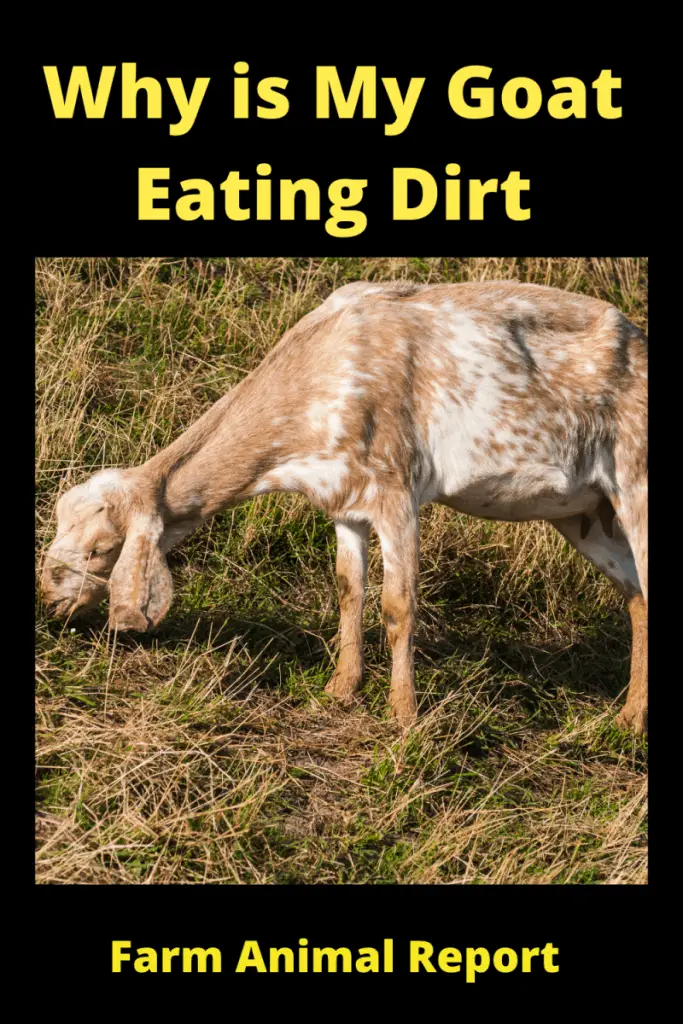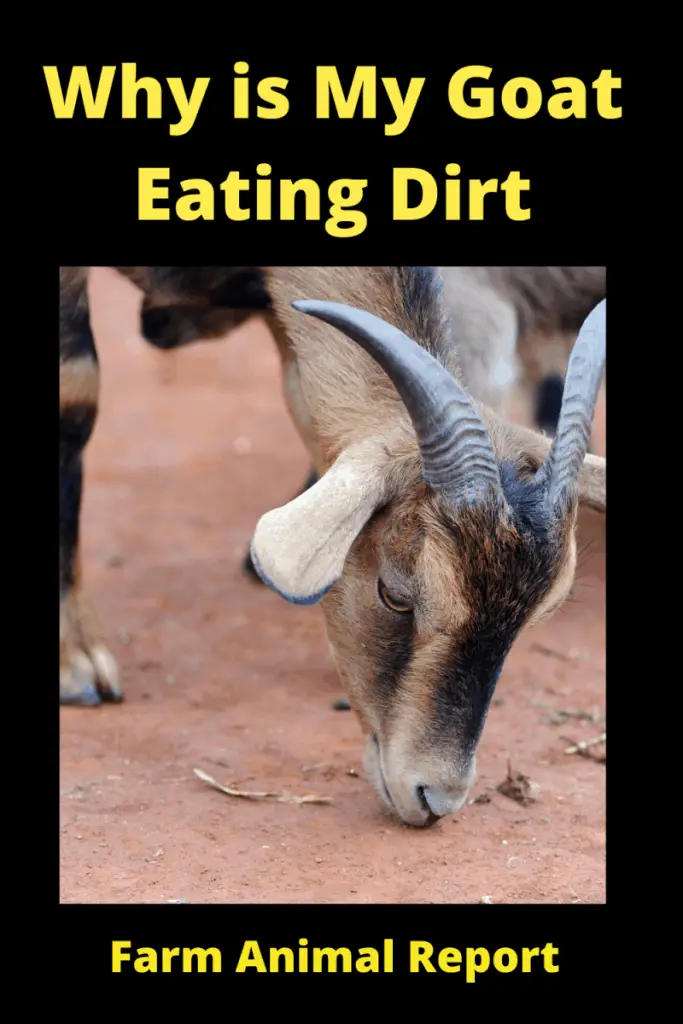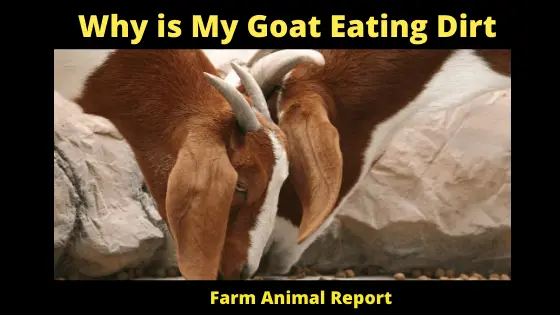Why is My Goat eating Dirt?
Why is My Goat eating Dirt, then there will be a deficiency of the minerals in the goat. Minerals are the backbone of the goat’s diet. Assuming you have a good foundation of quality food in your goat’s diet, you should know how important the minerals are in the goat’s body.
Sometimes people offer a salt mineral block and a trace mineral block and give their animals free choice. They just grabbed whatever standard mineral was available at the local feed store.
Now, most people have learned how important minerals are, and our goats are healthier than ever.
The Effect of Mineral Deficiencies in Goats:
You can feed your goats protein, fat, and carbohydrates, but if they don’t have a proper amount of minerals, they will not get the nutrition they need. And deficiencies can lead to a host of issues. Here are some symptoms associated with mineral deficiencies:

Selenium Deficiency:
Large parts of the United States have selenium-deficient soil. Selenium deficiency is widespread in most of the eastern coast of the U.S., into the Great Lakes area, and throughout the northwestern part of this country. Plants grown in these soils are selenium deficient; therefore, they cannot provide adequate selenium to the goats that eat them.
Causes of Selenium Deficiency:
- Like vitamin E deficiency, Selenium deficiency can cause white muscle disease (nutritional muscular dystrophy), causing the goat to have difficulty controlling its muscles.
- Newborns with weak rear legs may be selenium deficient. Kids may be too weak to nurse their dams.
- Pneumonia can result from weakness in muscles that control breathing.
- If you are raising goats on selenium-deficient soil, you must make sure that this mineral is added to the processed feed.
- Many producers give selenium base injection from outside. Which provides the selenium, and it will prevent the selenium deficiently.
Zinc Deficiency:
It will stiff the joints. The skin problem will occur due to the deficiency of the zinc. Breeding problems will also occur due to this deficiency. The female goat will never interest inbreeding. Mean the female will be lack of the libido. The hooves will become deformed. There will be excessive salivation due to the deficiency of zinc. Selenium deficiency may cause abnormally small testicles. Zinc is needed in the synthesis of proteins and DNA and cell division.
See Our Guide – 8 Ways to Make Money from Goat Farming
Copper / Molybdenum Deficiency
There will be the problem of coarse hair in the goat. Goat hair will be curled at the end only. There will be the issue of abortion, stillbirths. There will be the issue of weight loss and also a low milk supply.
Molybdenum and copper amounts must be balanced, or health problems occur. More than three parts per million molybdenum bind copper, creating a copper deficiency.
Copper Toxicity
Copper toxicity can occur by feeding too much copper. Make sure that the copper level in feed is correct for your goats by consulting a trained goat nutritionist knowledgeable about your area. Do not depend upon the advice of feed store owners. They in the business of selling feed and most have almost zero knowledge of goat nutrition and health.
Calcium / Phosphorus Deficiency:
Calcium and phosphorus must be in proper balance, or serious illness can occur. Female goats that have been bred at too young can develop lameness and bowed legs if they are calcium deficient. Calcium is essential to bone formation and muscle contractions (including labor contractions). A calcium to phosphorus ratio of 2-1/2 to 1 is correct and helps prevent urinary calculi. Too much phosphorous concerning calcium causes urinary calculi. An imbalance of calcium and phosphorus about calcium. Plants fertilized with chicken litter are high in phosphorous, resulting in calcium to phosphorous imbalance.
Check your current fodder and determined the value of phosphorous if you found that your fodder is deficient with phosphorus then provide your animal from outside.
Iodine Deficiency:
Goiters are the most visible sign of iodine deficiency. Newborns whose dams are iodine deficient can be born with goiters. Commercial feeds and minerals contain non-iodized salt, so it may be necessary to offer iodized salt on a free-choice basis. A quicker method of getting iodine into the goat is to paint liquid iodine on the hairless tail-web and offer seaweed free of choice.
Iron Deficiency:
Unless worms infested, foraging goats generally don’t experience iron deficiency. Certain onion-type plants, however, can cause anemia. Stomach worms, suckling lice, and blood loss are a common cause of anemia in goat.
Goats that are seriously ill with anemia may be supplemented with injectable iron or oral administration of red cells. An excess of iron can contribute to decreasing fertility in goats.
Sodium Deficiency:
If there is a deficiency of sodium, the goats will lick the ground or eat dirt. It is the main cause of eating dirt.
Manganese Deficiency:
The slow growth rate in kids reduced fertility and abortion in does, improperly formed legs, and difficulty in walking are general signs of manganese deficiency. Too much calcium interferes with manganese absorption.
Boron Deficiency
There will be problems in the joint. It will cause arthritis. Choosing your goat’s minerals: When it comes to choosing how to supplement your goat with minerals, the best course of action is always to start with their feed. What you feed them daily will determine how much you will need to supplement them with minerals. Goats owners will often view their goats as severely deficient in many minerals, when in fact, they usually are only lacking in a few core minerals.
Let’s breakdown what your goat should already be getting from their feed.

Feed Recommendations
Alfalfa hay:
Contains between 15 to 22% crude protein as well as an excellent source of vitamins and minerals. Specifically, alfalfa contains vitamins A, D, E, K, U, B1, B2, B6, B12, Niacin, Pantothenic acid, Inositol, Biotin, and Folic acid. Alfalfa also contains the following minerals: phosphorous, calcium, Potassium, Sodium, chlorine, sulfur, magnesium, copper, manganese, iron, cobalt, boron, and Molybdenum and trace elements such as Nickel, Lead, Strontium, and Palladium.
Grain feed:
Usually, a combination of oat, barley, and wheat, through some goat feeds have soy and corn in it as well. From the combination of these grains, you an expert for them to get a wide range of vitamins and minerals.
Minerals:
Always choose the healthy brand minerals which contain all the minerals included trace minerals and also macro-minerals or micro-minerals.
Salts:
If a goat lacks salt in its diet, it may lick the ground to get salt from the dirt. Offer salt as part of an appropriate loose mineral mix on a free-choice basis. Do not force-feed salt by mixing it with processed feed. Salt is often used as a feed limiter, as heavily salted rations cause goats to eat less. A pregnant doe who consumes too much salt may have udder problems. It may develop edema. Do not feed salt or mineral blocks to goats. Goats bite, damaging their teeth; cattle lick. Use loose minerals with goats.
Sulfur Deficiency:
Excessive salivation may be a sign of sulfur deficiency. A properly balanced loose mineral and vitamin mix is required. Do not directly supplement sulfur, because it can bind up iron and copper.
Potassium Deficiency:
Goats on forage usually get all the potassium they need. Penned animals need potassium added to their processed grain mix. Emaciation and muscle weakness are signs of severe potassium deficiency.
Why young kids eat dirt?
Three reasons why a young kid will eat dirt:
- trying to get rumen microbes
- starving-not enough milk. This will frequently happen with poor milking mothers the survival instinct kicks in, and the kid starts to eat anything and everything
- Mineral deficiency.
Floppy kid syndrome:
Kids may suffer from floppy kid syndrome.
Affects kids from 3-21 days of age. Some get it younger or older; they can have it twice.
Symptoms:
- The first symptom is a wobbly or unsteady gate. If you see a kid cross his back legs when he is walking or runs a few steps and stumble, he is probably in the early stages of floppy kid syndrome.
- Kids seem to eat dirt have dirty mouths and faces.
- You can tell their kid has not nursed well.
- You can sneak up and catch pasture kids; they don’t try to run off.
- Dam raised kids tend to be hollow, have not nursed, and appear to be weak.
- Bottle kids tend to show the more prominent full belly the gut shuts down, and milk stays in the stomachs. The kids seem to slosh when shaken. These kids need to be treated with Pepto and baking soda.
- Kids become lethargically unable to stand and eventually unable even to hold their heads up. They become flat, unable to control any muscles.
- Some kids run high fevers others do not.
- Some kids show signs of respiratory distress; some don’t.
- Inexperienced observers may diagnose these kids as having pneumonia.
What kind of treatment may you give in this case?
- If caught early enough (kids that are just starting to stumble), kids can be left on their dams.
- Treatment needs to be continued for three days, even if the kids act fine on day 2.
- Treat daily for three days with:
- 500mg Thiamine
- 2ml penicillin
- 2ml B complex
- This can be mixed and give orally.
- If the kids are flat when you find them give the following in addition to the above treatment:
- 1ml penicillin SQ.
- Electrolyte or 50% dextrose given.
- Orally do not give milk if their gut has shut down. Tube feeding may be necessary.
- Probiotics mix with electrolytes to start the good bacteria going in the gut.
- If the kids are out with their dams, be careful they don’t get out in the sun and try to cook. These kids tend to seek out the sunny spots and dehydrate quickly.
- If the kid’s gut is full and is not functioning, a dose of Pepto-Bismol and a baking soda will help.
- If the kid is flat:
Prop him up on his brisket and hold his head and neck up with a rolled-up towel. Keep kids hydrated tube feed electrolytes or 50% dextrose. Withhold milk until the kids have been up and moving well for 8 hours. Don’t let him get too cold or too hot.
When a kid eats dirt, it is very dangerous for the kid. And treatment do as soon as possible to save the life of a kid. Above all, treatment is the best treatment for this disease.
Eating Dirt That Contains Microbes is Very Beneficial to a Young Goat Kid Digestive System?
- Yes, it can be beneficial to goat kids, and especially those that are nursing. The microbes they need are in that dirt, but unfortunately, many other microbes are in too.
- Bottle babies don’t have the same proteins coming to them that they would get from their mothers.
- They get amino acids from replacers and denatured proteins from pasteurized milk, but it is not the same as the proteins in their mothers’ milk. It isn’t as good for their immune system.
- So, if nursing kids eat dirt, he has a better chance of keeping the good microbes while throwing off the bad ones. A bottle baby may not have the immune system to do that, and they can come up with some bizarre problems.
- But, not all bottle babies will have problems with it either. They are all individuals. They metabolize. Differently, they have different metabolic needs, and they have different immune systems as individuals.
- But, the rule of thumb is, if one is eating dirt or poop so frequently or in such quantities that you notice it. It seems to be more than what the others are consuming, it’s a pretty good bet that’s the one that has a need that isn’t being met, and that’s the one who will pop up with a problem as a result of it.
- Always check with your Vet so he can advise you.


